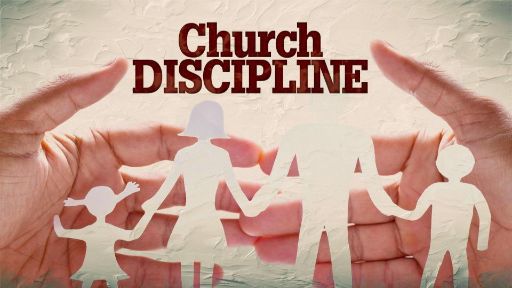-
"Discipline" Pt 2 Series
Contributed by Clark Tanner on Nov 28, 2017 (message contributor)
Summary: A look at how Paul’s instructions for church discipline line up with Matthew 18
1 Timothy 5:20
20 Those who continue in sin, rebuke in the presence of all, so that the rest also will be fearful of sinning.
As we come to consider part 2 of our examination of scriptural admonition in reference to church discipline, I think it is wise to carefully remind ourselves, and by ‘ourselves’ I mean you and I mean myself, that it is our duty to lay aside preconceived ideas and notions and attempt to lay aside past experiences, especially personally painful ones, and strive to see clearly and only what the Bible says to us on this very sensitive and potentially explosive subject.
Now I have done two things very deliberately right at the outset, just to put everything on the table in order to ward off any temptation to pussyfoot and soft pedal the issue at hand.
First, I chose to use the word “Discipline” as my title for this two-part series because that is simply the reason we are doing this study, and secondly, although we will be looking at several scripture passages I chose to open this second part with 1 Timothy 5:20 because the idea of bringing an offender before the congregation is undoubtedly the most sensitive aspect of the consideration of church discipline and I wanted you to know that we aren’t going to tiptoe around that either.
Now it has been my observation as I have known preachers and listened to preaching over the years that there is a natural tendency in men, once they have studied and preached once or twice on a passage or topic, to stop learning in reference to that passage or topic.
I think it is a temptation that needs to be guarded against carefully.
The Word of God is a deep ocean and every time we plunge its depths, especially when we’re in familiar waters, we ought to attempt to dive deeper than the time before and find new treasure to come up with.
The preacher is commissioned to feed the flock. If I have not found fresh meat in my study then I have only old and stale stuff to give my listeners.
Typing these thoughts out I was reminded of my favorite scene from the movie “The Odd Couple” which starred Jack Lemon and Walter Matthau.
Matthau’s character, Oscar Madison, was playing poker with some buddies and he went to the fridge to see what was there for them all to snack on.
He comes back out of the kitchen, wearing an old shirt that is wet under the arms with sweat, and under each arm he has sandwiches tucked while holding several also in each hand.
He announces, “Ok, I have green and brown. Who wants what?” One of the guys at the card table asks, “What’s the green?” Oscar looks down at the sandwiches in his hand and says, “Either very new cheese or very old meat”.
The guy chose the brown.
Anyway, I don’t want to give you too new cheese, meaning I haven’t studied and prayed it through enough, or very old meat, meaning I haven’t bothered to go back to the text and found fresh stuff.
Because you see, when you think you know a passage or a particular verse of scripture because you’ve read it many times, and maybe you’ve used it as a side reference in other sermons, quite often when you go to it and really pay attention to the wording of it and the context in which it is said, you will discover that in only scratching the surface you have misapplied, perhaps only in your own thinking, the intent and the content of scripture.
The reason I’m telling you all of this is because in my researching this topic more carefully than ever before, since I haven’t seen a need in the past to address it this thoroughly, I was forced to tweak my own thinking a little in reference to church discipline.
RECAP
Let’s take a brief look back before we go on, just to have some main points from part 1 fresh in our thinking.
First we noted that Jesus was talking about relationships between Christians. That means two people who are born again. They have the Holy Spirit in them. The Spirit of Christ. This reminded me of something I read by J.B. Phillips.
Every time we say, “I believe in the Holy Spirit,” we mean that we believe there is a living God able and willing to enter human personality and change it.
So when confronting a sinning brother we understand that we should go fortified by prayer, and being led of the Holy Spirit, humbly and in love, and trust the Holy Spirit to be the life-changer, not the strength of our argument or the weight of guilt we can administer.

 Sermon Central
Sermon Central



